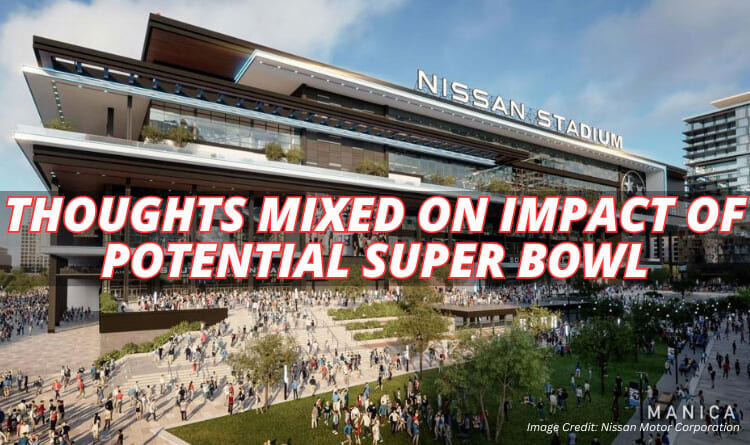Image: A rendering of new Nissan Stadium in Nashville Image Credit: Nissan Motor Corporation
The Center Square [By Jon Styf] –
A bill that would allow the Tennessee Department of Tourism to keep mega-event contracts hidden for up to 10 years headed to the desk of Gov. Bill Lee this week, where it’s expected to be signed.
The department currently has $25 million in a mega-event fund to use to lure events such as a push to hold the 2028, 2029 or 2030 Super Bowl to the new Nissan Stadium.
Holding a Super Bowl was part of the push for public subsidies for the new stadium, including $500 million directly from the state of Tennessee and an estimated $3.1 billion tax capture to pay off bonds for the $2.1 billion stadium and contribute to future maintenance and infrastructure at the site.
Economists say the actual impact of Super Bowls, however, rarely matches what is promised in economic impact reports.
A recent analysis from by Berry College Professor of Economics Frank Stephenson showed Las Vegas saw an increase in hotel room occupancy and rates during Super Bowl week and a hangover of decreased occupancy and rates in the days after.
Stephenson has studied hotel numbers related to large sporting events for years, including writing a paper on hotel impacts of Super Bowls, and said that the Las Vegas Super Bowl numbers showed a 3.5% increase year over year in room rentals for the three-day Super Bowl weekend and a 6% drop on Monday and Tuesday afterward, part of a “hangover effect.”
Rooms rates for the weekend were up $300 per night, meaning between the weekend and hangover, hotel revenue was up around $150 million.
Stephenson looked at Nashville data for this Super Bowl weekend and found that hotel occupancy was at just 55%, though it grew to between 70% and 80% the following weekend.
Overall, Nashville has averaged around 65% occupancy in February compared to 75% in July.
He called occupancy in Nashville during this year as a low point for the rates.
“Nashville is not as busy as Las Vegas in the Super Bowl period, but it’s not a ghost town either,” Stephenson said.
Economist Victor Matheson, a sports economist at the College of Holy Cross in Worcester, Massachusetts, previously told The Center Square that Super Bowl impact reports often have large numbers before the event, but the real numbers are closer to $30 million to $130 million of added economic activity.
West Virginia University economics professor Brad Humphreys pointed out that this year’s Super Bowl was a large part of the pitch for Nevada to give $380 million in subsidy for the construction of Allegiant Stadium.
Humphreys said most of the past 20 Super Bowl host cities were tied to public subsidies for new stadiums.
“The reason hosting the game provides no tangible economic benefits is that it is a single game,” Humphreys said. “While the game clearly draws a lot of people from out of town to the host city, the cities that host the Super Bowl are all large tourist destinations in their own right.”
Much of that is due to crowding out of other visitors in the host city, which Stephenson said could have contributed to Las Vegas seeing modest occupancy increases for Super Bowl week and higher occupancy rates two weeks later.
“The spending by fans going to the game just replaces spending by other visitors,” Humphreys said. “That’s not net new economic impact. It’s just dollars coming out of the pockets of a different group of visitors.”
Stephenson noted that higher hotel rates during Super Bowl week often lead to more money going to corporate hotel owners but do not necessarily create funding that is then re-spent in the host city.
“It goes in the front door and out the back door,” Stephenson said.


About the Author: Jon Styf, The Center Square Staff Reporter – Jon Styf is an award-winning editor and reporter who has worked in Illinois, Texas, Wisconsin, Florida and Michigan in local newsrooms over the past 20 years, working for Shaw Media, Hearst and several other companies. Follow Jon on Twitter @JonStyf.












